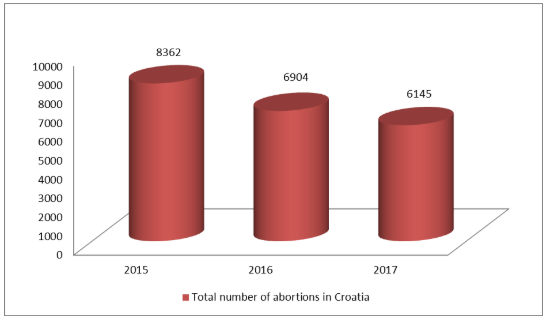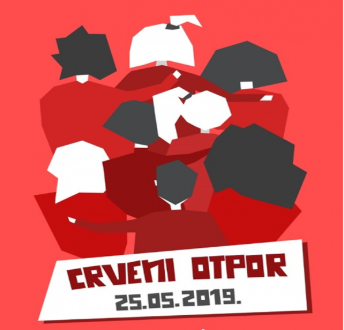In 2015 Josipa Tukara wrote an article on abortion rights in Croatia. Four years have passed since then. What has happened during these years in Croatia?
In 2017, there were 6 145 abortions in Croatia. That is a decrease in comparison to prior years. 80% of them were until the 10th week, 60% were unintentional abortions and 39,32% were legally induced. Croatia has one of the lowest abortion rates in the EU, but can we trust these numbers? No, mainly because many Croatian women go to other countries to get an abortion. Slovenia has, for example, become a hot spot for abortions among Croatian women.
Based on the data collected by reporter Danka Derifaj and journalist Mašenjka Bačić, an interactive map on abortion availability in Croatia was created. The map includes data of 27 public clinics. There are in total 322 specialists, of whom 186 refuse to perform abortions. The price varies from around 254 to 407 euros. In some parts of Croatia, all specialists refuse to perform abortions, which means women have to go somewhere else.
The reason behind this refusal to perform abortions is the latest trend in Croatian hospitals – the exercise of conscience. Doctors claim that the exercise of conscience is their inalienable human right protected by the Constitution. They argue that they are free to choose whether to perform an abortion or not, but won’t leave this choice to their patients. This practice is very widespread, even among midwives and pharmacists.
The New Abortion Law
Abortion is still a burning topic among many opponents. The Constitutional Court of Croatia deliberated in 2017 on the issue of the availability of abortion, concluding it must be legal. Croatia was supposed to get a new abortion law after 41 years, but it probably will not in the near future. This is because the current right-winged government does not want to antagonize a huge part of Croatia that is pro-choice while it also needs votes from its voter base that is against choice.
In the media, there was some discourse on this at the beginning of this year. The Minister of Health formed a committee of 10 experts. Immediately, a problem arose because most of them already expressed conservative stances. There were talks that abortion would still be allowed up to 10 weeks, but that there would also be consultations with women before the procedure. Hospitals would have to make sure that they have doctors who perform them, and women would still pay themselves.
The side that wants to protect women’s right to choose has written its own proposal of the new law. They want abortion to be legal up to 12 weeks and introduce fines for any pressure and intimidation of women who decide to get an abortion. They want better health education programmes in schools and a bigger focus on prevention. Finally, they want to introduce a definition of the exercise of conscience as a ‘refusal to perform a legal termination of pregnancy due to one’s conscience and religious beliefs’.
The Two Sides
Volunteers of the initiative ‘40 days for life‘ still harass women in front of hospitals and pull them by their sleeves. These critics say they want to protect life, but on the other hand, aren’t so outspoken about other problems concerning born children. They stand and pray for strangers who didn’t ask them to interfere in their privacy. Allegedly, they even publish names of specific women and call people to come and demonstrate on a specific day.
Every year a peaceful protest called ‘Walk for life‘ is organised in the biggest Croatian cities. The protesters say they want to protect all life and give support to every family. During that time, pro-choice activities are also organised, and they call for safe, available, and free abortion. Oganisations such as the Platform for Reproductive Rights, Zagreb Anti-Fascist Network, Social Democratic Party of Croatia and others call for better sexual education, free abortion and publicly funded and available contraception.
Dear Future Reader
Abortion is a deeply personal decision. Some women will decide to continue with their pregnancy and have children, while others might decide to terminate. The truth is that abortions will continue to occur, and women should be able to fully decide when it comes to their bodies. Lets then make them safe and educated!
Josipa showed us the state of abortion in Croatia in 2015, and this is the state in 2019. Things are not peachy, but at least we can choose. Today in Croatia, there are two strong currents – pro-choice and against choice. I think that abortions will still be legal in the future, but I am afraid they will be less accessible. Who knows what the situation will look like four years from now? Dear reader, if you are reading this article in the future, we want to hear from you! Are abortion rights protected in Croatia?
Pravo na pobačaj u Hrvatskoj 4 godine poslije
Josipa Tukara je 2015. godine napisala članak o pobačajima u Hrvatskoj. Od tada su prošle četiri godine. Kakvo je sada stanje?
U 2017. je u Hrvatskoj bilo 6 145 pobačaja. To je pad usporedno s prijašnjim godinama. 80% ih je bilo do 10. tjedna, 60% su bili nenamjerni pobačaji, a 39,32% legalno inducirani. Hrvatska ima jednu od najmanjih stopa pobačaja u EU, ali treba li vjerovati ovim brojkama? Ne jer mnoge Hrvatice na pobačaje idu u druge države. Slovenija je, na primjer, među Hrvaticama postala popularno mjesto.
Na temelju podataka koje su prikupile reporterka Dana Derifaj i novinarka Mašenjka Bačić, izrađena je interaktivna karta dostupnosti pobačaja u Hrvatskoj. Karta uključuje podatke o 27 javnih bolnica. Od ukupno 322 specijalistica/a, njih 186 odbija raditi pobačaje. Cijene variraju od 1870 kn do 3000 kn, a u nekim dijelovima Hrvatske sve specijalistice/i ih odbijaju izvoditi što znači da žene moraju ići drugdje.
Razlog odbijanja je posljednji trend u hrvatskim bolnicama – priziv savjesti. Liječnice/i tvrde kako je to njihovo neotuđivo ljudsko pravo zaštićeno Ustavom. Oni se bore za svoju slobodu izbora kod izvođenja pobačaja, ali jednako ne žele dati i svojim pacijenticama. Ovo je jako prošireno, čak i na babice i ljekarnice/ke.
Novi zakon o pobačaju
Pobačaj je još uvijek goruća tema s puno protivnica/ka. Ustavni sud je 2017. rekao da pobačaj mora biti legalan. Hrvatska je nakon 41 godine trebala dobiti novi zakon o pobačaju, ali vjerojatno neće jer trenutna desna vlast ne želi naljutiti velik dio Hrvatske koji je za izbor, ali niti svoju bazu glasačica/a koja je protiv izbora.
U medijima je početkom godine o ovome bilo neke priče. Ministar zdravstva oformio je odbor od 10 stručnjakinja/a i odmah se javio problem jer je većina njih izrazila konzervativne stavove. Govorilo se kako će pobačaji ostati mogući do 10. tjedna, ali i o konzultacijama prije postupka. Bolnice bi trebale osigurati liječnice/ke koji će ih raditi, a žene bi ih i dalje plaćale same.
Strana koja želi zaštiti pravo izbora žena imala je svoj prijedlog novog zakona. Žele da pobačaj bude dostupan do 12. tjedna i kazne za oni koji zastrašuju žene koje se odluče na pobačaj. Žele bolji zdravstveni odgoj u školama i veći fokus na prevenciji. Također, žele da se priziv savjesti preimenuje u „odbijanje pružanja legalnog prekida trudnoće zbog nečije savjesti i religioznih uvjerenja“.
Dvije strane
Volonterke/i inicijative „40 dana za život“ još uvijek teroriziraju žene ispred bolnica, vuku ih za rukave, a neke čak unutra ni ne idu zbog pobačaja. Ove kritičarke/i govore o zaštiti života, ali s druge strane nisu tako glasne/i kod pitanja koja se tiču rođene djece. Stoje i mole se za strance koji nisu tražili petljanje u svoju privatnost. Navodno čak objavljuju i točna imena žena i zovu na molitvu na točne dane.
Svake godine se u najvećim gradovima održava mirni prosvjed „Hod za život“. Hodačice/i kažu da žele zaštiti svaki život i dati podršku svim obiteljima. U to vrijeme održavaju se i akcije zaštite izbora koje traže siguran, dostupan i besplatan pobačaj. Platforma za reproduktivna prava, MAZ, SDP i puno drugih organizacija traže bolje seksualno obrazovanje, besplatan pobačaj te javno financiranu i dostupnu kontracepciju.
Izvor: Akcija „Crveni otpor“ tijekom „Hoda za život“ pozivala je na oblačenje crvenog u znak zaštite izbora
Draga buduća čitateljice
Pobačaj je duboko osobna odluka. Neke žene će odlučiti nastaviti svoju trudnoću i imati djecu, a neke ne. Istina je da će se pobačaji nastaviti te bi žene same trebale odlučiti o svojim tijelima i životima. Učinimo ih onda sigurnim i educiranim!
Josipa nam je pokazala Hrvatsku iz 2015., a ovakva je u 2019. Stvari nisu bajne, ali možemo birati. Postoje dvije snažne struje – za i protiv izbora. Mislim da će pobačaji u budućnosti još uvijek biti legalni, ali se bojim da će biti teže dostupni. Tko zna kakva će situacija biti za četiri godine? Draga čitateljice, ako ovo čitaš u budućnosti, želimo te čuti! Je li pravo izbora zaštićeno u Hrvatskoj?






Average Rating